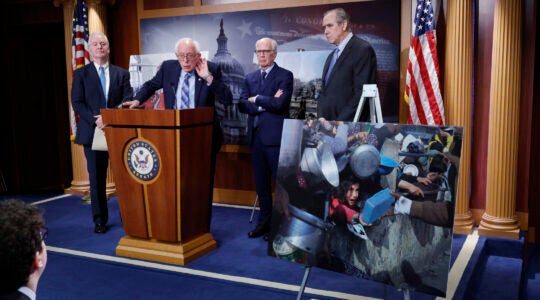WASHINGTON (JTA) – In his 27 years in the U.S. Congress, Rep Tom Lantos had two constituencies – California’s 12th District, encompassing parts of San Francisco and its suburbs, and the ghosts of the Jews who perished in his native Europe.
Lantos (D-Calif.) announced his retirement Wednesday, citing a cancer diagnosis.
“Routine medical tests have revealed that I have cancer of the esophagus,” he said. “In view of this development and the treatment it will require, I will not seek re-election.”
Lantos, who turns 80 next month, said he would serve out his term, which ends at the end of this year. He is the chairman of the House of Representatives’ powerful Foreign Affairs Committee and has long been seen as a go-to lawmaker on an array of Jewish issues.
In speeches, releases and statements, Lantos was as likely to mention his home district as he was his status as “the only Holocaust survivor elected to Congress.”
That was the phrase Rep. Nancy Pelosi (D-Calif.), the House speaker, appropriated in her statement, issued within minutes of Lantos’ own.
“Tom Lantos is one of America’s leading experts on foreign affairs and most effective advocates for human rights both at home and abroad,” Pelosi said. “As the only Holocaust survivor ever elected to Congress, he has used his position to fight for those whose voices have been silenced by hatred and oppression.”
The American Israel Public Affairs Committee described him as a ubiquitous presence in U.S.-Israel relations.
“There is not a single issue impacting the U.S.-Israel relationship that does not carry the imprint or leadership of Tom Lantos,” said a joint statement by AIPAC’s president, Howard Friedman, and its executive director, Howard Kohr.
“A living witness to a time in history when man’s inhumanity was at its height, Congressman Lantos has dedicated his life and career to ensuring that America’s humanity illuminates the dark places of our world. His leadership has left an indelible mark in service to his country and in improving the lives of countless people throughout the United States and across the globe. During the difficult time ahead for the congressman and his family, the pro-Israel community wishes him strength and a return to health.”
Lantos most recently led the battle to substantially expand sanctions against Iran, a bill that passed overwhelmingly in the House and is under consideration in the Senate.
At the same time, he is a strong advocate of reaching out to rogue states, even Israel’s most bitter enemies. Lantos played a role in swaying Libya to give up its own weapons of mass destruction program in 2003 and has said he is willing to meet Iran’s leadership.
His pro-Israel credentials were critical in giving Pelosi the upper hand when she came under fire from the White House in April for visiting Syria and delivering a peace message from Israeli Prime Minister Ehud Olmert.
“It’s obvious the White House is desperate to find some phony criticism of the speaker’s trip, even though it was a bipartisan trip,” Lantos told JTA at the time. “I have nothing but contempt and disdain for the attempt to undermine this trip.”
Lantos was 16 in 1944 when the Nazis invaded his native Hungary. He fought in the anti-Nazi underground and arrived in the United States in 1947 to study.
“It is only in the United States that a penniless survivor of the Holocaust and a fighter in the anti-Nazi underground could have received an education, raised a family, and had the privilege of serving the last three decades of his life as a member of Congress,” he said in his statement. “I will never be able to express fully my profoundly felt gratitude to this great country.”
His Holocaust experience sufused his politics. His congressional Web site features links not only to his biography but to his own account, titled “A Holocaust Survivor,” and another reprinting his contribution to a book published by Steven Spielberg’s Shoah Foundation, “The Last Days.”
Lantos was an economist and a consultant prior to his 1980 election to represent a San Francisco-area district, yet it soon became clear that human rights above all drove his congressional mission.
He and his wife, Annette, took the lead in the 1980s in meeting with Jews in the former Soviet Union and interceding on their behalf, said Mark Levin, the executive director of NCSJ: Advocates on behalf of Jews in Russia, Ukraine, the Baltic States and Eurasia.
“He was able to put the cause of human rights at the forefront of U.S. foreign policy,” Levin said.
In 1983, Lantos helped found the congressional Human Rights Caucus.
“He always did what he thought was right, and didn’t care who liked and didn’t like it,” said Rep. Eliot Engel (D-N.Y.), who described Lantos as a mentor. “He always had a bit of a swagger to him.”
His appeal crossed the political aisle. Rep. Ileana Ros-Lehtinen (R-Fla.), his committee’s ranking minority member, called him “a man of enormous integrity, energy and substance.”
His commitment to human rights did not bow to other loyalties.
The sultans of Silicon Valley, in his district, winced when he excoriated the bosses of Yahoo, Google, Microsoft and Cisco for cooperating with Internet censors in China. In a 2006 hearing with representatives of those companies, Lantos used the word “ashamed” nine times.
“We comply with legally binding orders whether it’s here in the U.S. or China,” the Microsoft representative said, to which Lantos responded: “Well, IBM complied with legal orders when they cooperated with Nazi Germany.”
Lantos’ “unique position as the only Holocaust survivor to serve in Congress gave him the moral authority to speak out on behalf of those who had no one to speak out for them,” said William Daroff, the Washington director of United Jewish Communities, the federations’ umbrella.
Lantos had the gentlemanly bearing of his central European upbringing, delivering blunt messages draped in velvet sarcasm.
It was a style that sometimes turned off others in the Jewish community who saw it as imperious. Some critics said Lantos practiced “with-me-or-against-me politics,” cold-shouldering those who did not champion his favored causes – including the New Hampshire political career of his daughter, Katrina Swett.
In September, Swett dropped her bid for the U.S. Senate while suggesting she would try again in 2010.
The conversion of his two daughters and wife, a fellow Hungarian Holocaust survivor, to Mormonism raised some eyebrows in the Jewish community. The couple has 17 grandchildren. Lantos continues to identify as a Jew.
Winning the chairmanship of the House Foreign Affairs Committee when the Democrats retook Congress in 2006 culminated years of hard work for Lantos, who had been the ranking Democrat under a succession of Republican chairmen.
“He really came into his own in his chairmanship of the Foreign Affairs Committee,” said Ira Forman, the executive director of the National Jewish Democratic Council.
The committee is packed with Jewish members, with four chairing subcommittees. Two Jewish members are expected to compete to succeed Lantos: Rep. Howard Berman (D-Calif.), the committee’s deputy chairman, and Rep. Gary Ackerman (D-N.Y.), the chairman of its Middle East subcommittee.
Lantos was critical not only in promoting U.S.-Israel ties but also a range of other issues championed by Jewish organizations, said Hadar Susskind, the Washington director for the Jewish Council for Public Affairs.
Lantos took the lead in pushing sanctions against Sudan for failing to stop the genocide in Darfur, where government-allied militias have killed hundreds of thousands of civilians, and shaping the international components to the Energy Act just signed by President Bush that seeks to reduce reliance on fossil fuels.
On Darfur, Susskind said Lantos has “long been considered a voice of conscience there.”
In October, his committee voted to declare as genocide the World War I massacre of as many as 1.5 million Armenians by Ottoman forces.
Jewish organizations had lobbied against the genocide designation. Jewish members on the committee were torn between casting a vote they knew could damage strong Israel-Turkish ties and colluding with a fudging of language that some saw as having echoes of Holocaust denial.
Lantos joined the seven Jews who cast a vote for the genocide designation, saying he had “never been more proud” of the committee.
JTA has documented Jewish history in real-time for over a century. Keep our journalism strong by joining us in supporting independent, award-winning reporting.





